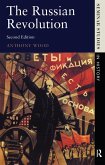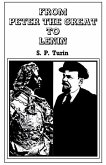In "Russian After Lenin," Vladimir Brovkin offers a comprehensive cultural, political, economic and social history of developments in Russia in the 1920s. By examining the contrast between Bolshevik propaganda claims and social reality, Brovkin explains how Communist representations were variously received and resisted by workers, peasants, students, women, teachers and party officials. He presents a picture of cultural diversity and rejection of Communist constraints through many means including unauthorized protest, religion, jazz music and poetry. Brovkin argues that these trends endangered the Communist Party's monopoly on political power and argues that the Stalinist revolution can be seen as a preemptive strike against this independent and vibrant society.
Dieser Download kann aus rechtlichen Gründen nur mit Rechnungsadresse in A, B, BG, CY, CZ, D, DK, EW, E, FIN, F, GR, HR, H, IRL, I, LT, L, LR, M, NL, PL, P, R, S, SLO, SK ausgeliefert werden.









